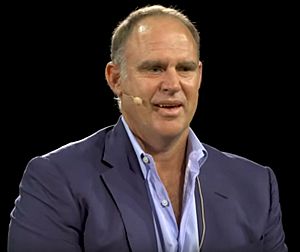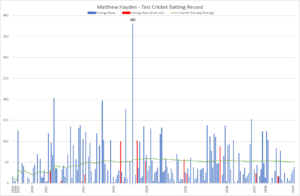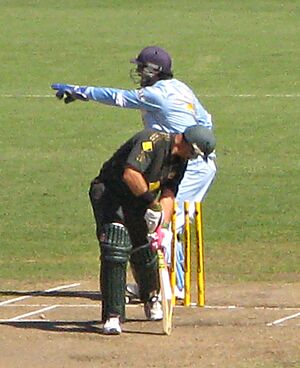Matthew Hayden facts for kids

Hayden in 2018
|
||||||||||||||||||||||||||||||||||||||||||||||||||||||||||||||||||
| Personal information | ||||||||||||||||||||||||||||||||||||||||||||||||||||||||||||||||||
|---|---|---|---|---|---|---|---|---|---|---|---|---|---|---|---|---|---|---|---|---|---|---|---|---|---|---|---|---|---|---|---|---|---|---|---|---|---|---|---|---|---|---|---|---|---|---|---|---|---|---|---|---|---|---|---|---|---|---|---|---|---|---|---|---|---|---|
| Full name |
Matthew Lawrence Hayden
|
|||||||||||||||||||||||||||||||||||||||||||||||||||||||||||||||||
| Born | 29 October 1971 Kingaroy, Queensland, Australia |
|||||||||||||||||||||||||||||||||||||||||||||||||||||||||||||||||
| Nickname | Haydos, Unit | |||||||||||||||||||||||||||||||||||||||||||||||||||||||||||||||||
| Height | 188 cm (6 ft 2 in) | |||||||||||||||||||||||||||||||||||||||||||||||||||||||||||||||||
| Batting | Left-handed | |||||||||||||||||||||||||||||||||||||||||||||||||||||||||||||||||
| Bowling | Right-arm fast-medium | |||||||||||||||||||||||||||||||||||||||||||||||||||||||||||||||||
| Role | Opening batsman | |||||||||||||||||||||||||||||||||||||||||||||||||||||||||||||||||
| Website | https://www.matthewhayden.com/ | |||||||||||||||||||||||||||||||||||||||||||||||||||||||||||||||||
| International information | ||||||||||||||||||||||||||||||||||||||||||||||||||||||||||||||||||
| National side |
|
|||||||||||||||||||||||||||||||||||||||||||||||||||||||||||||||||
| Test debut (cap 359) | 4 March 1994 v South Africa | |||||||||||||||||||||||||||||||||||||||||||||||||||||||||||||||||
| Last Test | 3 January 2009 v South Africa | |||||||||||||||||||||||||||||||||||||||||||||||||||||||||||||||||
| ODI debut (cap 111) | 19 May 1993 v England | |||||||||||||||||||||||||||||||||||||||||||||||||||||||||||||||||
| Last ODI | 4 March 2008 v India | |||||||||||||||||||||||||||||||||||||||||||||||||||||||||||||||||
| ODI shirt no. | 28 | |||||||||||||||||||||||||||||||||||||||||||||||||||||||||||||||||
| T20I debut (cap 13) | 13 June 2005 v England | |||||||||||||||||||||||||||||||||||||||||||||||||||||||||||||||||
| Last T20I | 20 October 2007 v India | |||||||||||||||||||||||||||||||||||||||||||||||||||||||||||||||||
| Domestic team information | ||||||||||||||||||||||||||||||||||||||||||||||||||||||||||||||||||
| Years | Team | |||||||||||||||||||||||||||||||||||||||||||||||||||||||||||||||||
| 1991/92–2007/08 | Queensland | |||||||||||||||||||||||||||||||||||||||||||||||||||||||||||||||||
| 1997 | Hampshire | |||||||||||||||||||||||||||||||||||||||||||||||||||||||||||||||||
| 1999–2000 | Northamptonshire | |||||||||||||||||||||||||||||||||||||||||||||||||||||||||||||||||
| 2008–2010 | Chennai Super Kings | |||||||||||||||||||||||||||||||||||||||||||||||||||||||||||||||||
| 2011/12 | Brisbane Heat | |||||||||||||||||||||||||||||||||||||||||||||||||||||||||||||||||
| Career statistics | ||||||||||||||||||||||||||||||||||||||||||||||||||||||||||||||||||
|
||||||||||||||||||||||||||||||||||||||||||||||||||||||||||||||||||
|
Medal record
|
||||||||||||||||||||||||||||||||||||||||||||||||||||||||||||||||||
|
Source: ESPNcricinfo, 17 August 2017
|
||||||||||||||||||||||||||||||||||||||||||||||||||||||||||||||||||
Matthew Lawrence Hayden (born 29 October 1971) is an Australian cricket expert and former player. He was a strong and attacking left-handed opening batsman. Hayden played a big part in Australia's success during its "golden era" from 2000 to 2008. He holds the record for the highest score by an Australian in Test matches, scoring 380 runs against Zimbabwe in 2003. This is the second-highest score ever in Test cricket. Hayden was also a key player in the Australian teams that won the 2003 Cricket World Cup and the 2007 Cricket World Cup.
In Australia, Hayden played for his home state, Queensland. He also played for the Brisbane Heat in the Twenty20 (T20) competition. Hayden stopped playing all forms of cricket in September 2012. In 2017, he was added to the Australian Cricket Hall of Fame. In September 2021, Hayden became the Batting Coach for Pakistan for the 2021 ICC Men's T20 World Cup.
Contents
Matthew Hayden's Life Outside Cricket
Matthew Hayden has had an interesting life beyond cricket. In 1995, he took part in the Gladiator Team Sports Challenge. Later, his boat overturned near North Stradbroke Island. He and two friends, including fellow cricketer Andrew Symonds, had to swim a kilometer to safety. After this, Hayden helped promote marine safety.
Hayden loves to cook and often made meals for his teammates. He even published two cookbooks, The Matthew Hayden Cookbook in 2004 and The Matthew Hayden Cookbook 2 in 2006. He used a special pink grip on his cricket bat to support breast cancer research. This was inspired by his teammate Glenn McGrath's wife, who sadly passed away from breast cancer. Matthew is married to Kellie and they have three children.
Hayden is a Roman Catholic. He has spoken about how his faith guides him. He was given the Australian Sports Medal in 2000. In 2009, he was named one of Queensland's "sports legends." In 2010, he received the Order of Australia for his service to cricket and his charity work. He is also an Ambassador for the Australian Indigenous Education Foundation.
Hayden's Cricket Career
Playing for Teams in Australia and England
Hayden played Sheffield Shield cricket for Queensland. He played 101 matches and scored 8,831 runs. He also played in England for Hampshire in 1997. Later, he captained Northamptonshire from 1999 to 2000. In his entire first-class career, he scored 24,603 runs.
Twenty20 Cricket Success
Matthew Hayden joined the Chennai Super Kings in the first Indian Premier League (IPL) in 2008. He became one of the best players in the league. In 2009, he won the "Orange Cap" as the highest run-scorer of the season, with 572 runs.
In 2011–12, Hayden played for the Brisbane Heat in Australia's Big Bash League. In 2010, he decided to use the Mongoose Cricket Bat in the IPL. This bat was designed for Twenty20 cricket. Some people had mixed feelings about the bat, but Hayden showed its power by scoring 93 runs off just 43 balls in one game.
Matthew Hayden's International Career
Test Match Journey
Hayden first played a Test match for Australia in 1994 against South Africa. He scored his first century (125 runs) against the West Indies in 1996–97. However, he was dropped from the team for a few years.
He kept playing well for Queensland, which led to his return to the Australian team in 1999–2000. His big breakthrough came during the 2001 tour of India. He scored 549 runs in that series, which was an Australian record for a three-Test series. After this, he became a regular player in the Test team. He scored over 1,000 Test runs in five different years (2001, 2002, 2003, 2004, and 2005), being the first player to do so.
On 10 October 2003, Hayden made history at the WACA against Zimbabwe. He scored an amazing 380 runs from 437 balls. This was a new world record for the highest individual score in Test cricket at the time. It broke the previous record of 375 by Brian Lara. Hayden's score remained the record until Lara scored 400 not out in 2004. As of July 2025, it is still the second-highest score in Test history and the highest ever by an Australian.
Hayden had a tough period in 2004 and 2005, not scoring a century for 16 Tests. But he bounced back with a crucial 138 runs in the final Test of the 2005 Ashes series against England. This helped him regain his form. He then scored centuries in four Tests in a row.
Hayden scored 30 centuries in his 103 Test matches. This puts him among the top Australian players with more Test centuries than Don Bradman. He also scored 29 half-centuries.
In 2007–2008, Hayden scored three centuries in a Test series against India. He had also achieved this feat two other times in his career.
Hayden's last season of Test cricket was 2008–09. He struggled with his form and decided to retire from all international and first-class cricket. He finished his Test career with 8,625 runs at an average of 50.73.
Hayden's most famous opening partner was Justin Langer. They opened the batting together in over 100 Test innings. They scored 5,654 runs together, which is one of the highest totals for an opening pair in Test history. Hayden was also a very good slip fielder, taking 128 catches in his Test career.
One Day International (ODI) Career
Hayden played 160 One Day International matches for Australia. He made his ODI debut in 1993 but was dropped from the team until 2000.
He was part of the Australian team that won the 2003 One Day International Cricket World Cup. He was dropped again after the 2005 Ashes due to poor form but returned in 2006–07.
On 20 February 2007, Matthew Hayden scored his highest ODI score: 181 runs not out against New Zealand. At the time, this was the highest ODI score by an Australian. This meant Hayden held both the Test and ODI highest score records for an Australian batsman for a while.
Hayden was the best batsman at the 2007 Cricket World Cup in the West Indies. He scored three centuries during the tournament. One of these centuries, against South Africa, came off just 66 balls, which was the fastest century in a World Cup at that time. He scored 659 runs in the tournament, making him the second player in World Cup history to score over 600 runs in a single tournament. In September 2007, he was named the ODI Player of the Year.
Hayden played one more season of ODI cricket, with his last match for Australia being in March 2008.
Twenty20 International Matches
Hayden played nine Twenty20 Internationals for Australia, including the 2007 ICC World Twenty20. He was the top scorer in that tournament, with 265 runs. He scored a total of 308 runs in T20 Internationals before retiring.
Retirement from International Cricket
On 13 January 2009, Matthew Hayden announced his retirement from international cricket. This decision came after a period of lower scores in matches against New Zealand and South Africa. His teammates, like Ricky Ponting and Justin Langer, praised him as one of Australia's greatest ever opening batsmen. His place in the team was taken by a young player named Phillip Hughes.
After retiring, Hayden continued to be involved in cricket. In March 2013, the Queensland Government asked him to lead a tourism campaign to attract more Indian tourists to Australia.
Best Performances in Cricket
| Batting | ||||
|---|---|---|---|---|
| Score | Fixture | Venue | Season | |
| Test | 380 | Australia v Zimbabwe | WACA, Perth | 2003 |
| ODI | 181* | New Zealand v Australia | Seddon Park, Hamilton | 2007 |
| T20I | 73* | Australia v Bangladesh | Newlands Cricket Ground, Cape Town | 2007 |
| FC | 380 | Australia v Zimbabwe | WACA, Perth | 2003 |
| LA | 181* | New Zealand v Australia | Seddon Park, Hamilton | 2007 |
| T20 | 93 | Delhi Daredevils v Chennai Super Kings | Feroz Shah Kotla Ground, Delhi | 2010 |
International Centuries
Matthew Hayden scored 30 centuries in Test matches and 10 centuries in One Day Internationals. He is known as one of the best Australian opening batsmen of his time. He also scored 29 half-centuries in Tests, 36 in ODIs, and three in T20 Internationals.
After Retirement from Playing
After retiring, Hayden has worked with Cricket Australia to help promote cricket among the Aboriginal and Torres Strait Islander people of Australia. In 2010, he captained the Indigenous All-stars XI team. He is also an Ambassador for the Australian Indigenous Education Foundation.
In 2017, Matthew Hayden was inducted into the Australian Cricket Hall of Fame. On September 13, 2021, he was announced as the head coach for Pakistan for the 2021 T20 World Cup. This was his first big coaching job. In September 2022, he was appointed as a mentor for the Pakistan team for the 2022 T20 World Cup.
See also
 In Spanish: Matthew Hayden para niños
In Spanish: Matthew Hayden para niños



